Thursday, January 31, 2008
Why can't Latin American countries do this?
Real estate in Florida might not be doing so great these days but it is roaring ahead in at least one other country according to yesterday's Wall Street Journal:
Yup, as crazy as it may sound to those of us old enough to remember the last time the U.S. military was getting its butt kicked by a rag tag guerilla army, Vietnam in the new real estate hot spot. Good for them. After the U.S. dropped more explosives on that country than were used by all participants in WWII, not to mention defoliating a good chunk of the country so it looked like the moon, its good to see the country being built up.
But of course this could all just be a speculative bubble - you know, like Miami.
But there is reason to think it is more than that. Reading on we learn why:
This is interesting, while Latin American countries can't seem to export much of anything besides natural resources Vietnam is seeing its exports grow more than 20% in ONE year based largely on exporting.... electrical goods.
Last year they had overall growth on a par with Venezuela's at about 8.5%. Yet while Venezuela's depended on you know what Vietnam is doing it without much in the way of natural resources. Can anyone say sustainable development.
(Full disclosure - Vietnam actually does export a significant amount of oil but it is their NON-OIL exports that are growing the fastest!)
Heck, even the New York Times couldn't help but notice:

Interestingly the Economist notes that while Vietnam has widespread corruption (GASP!) and fairly high inflation (BIGGER GASP!!) it still expects the country to keep surging ahead. It probably helps that, as The Economist points out in another (and very good) article, that the Vietnamese government actively works to keep its currency from appreciating against the dollar, even if it means they have higher inflation as a result:
Now I don't want to keep boring you with article after article and statistic after statistic showing how Vietnam is like to be the next South Korea, or Tawain, or China or "Tiger". And I am no expert on the Vietnamese economy (though I did note they score very low on the Heritage Foundation's Index of Economic Freedom which probably means they are doing a lot of good things)
But I think we should consider what even a country like Vietnam being able to use this export led model of development means. After all, when it has been pointed out that on this blog that the Asian model might be a good one for Venezuela to follow we have run into a number of objections (largely from supporters of Chavez I might add):
"We can't develop because imperialism won't let us develop - they only let South Korea develop as an anti-communist measure"
Gee, do you think maybe Vietnam knows a thing or two about imperialism? I mean, they did spend most of the 20th Century fighting off the French, then fighting the Japanese, then kicking the French's butts again, and finally defeating the most powerful military in the world that sent a half million troops to try and subjugate it. In the process it probably had more bombs dropped on it than any country in history, had all sorts of chemicals sprayed on it (remember "Agent Orange"), and had millions, yes millions, killed.
Vietnam's experiences with "imperialism" make what Latin American countries have gone look like childs play.
Yet here they are in 2008 successfully developing their country.
Maybe its time people stop using the "imperialism" excuse? I think so.
"China has only been able to develop because it is so big that the U.S. and others can't avoid dealing with it".
Ok. But Vietnam is no China either. In fact, both Brazil and Mexico have larger populations than Vietnam. And even a country like Venezuela, while smaller, isn't an order of magnitude of smaller.
So that excuse doesn't seem to have any more basis in reality than the first one did.
"To develop you have to have access to the U.S. market and the U.S. won't give it to country's that are resisting imperialism"
Well, lets go back to the stats. Last year Vietnam exported $48 billion worth of goods. $10 billion went to the United States. That means the remaining almost 80% went to other countries. So the U.S. would hardly appear to make or break countries by allowing or denying access to its market. The reality is there are plenty of other markets for exports - Europe, Japan, Canada, China, South Korea, Australia, Russia, etc. etc.
Once again, what we see here is and EXCUSE, not a REASON.
"We can only develop if all (most) of Latin American is united"
Well, unity is a good thing. But unity doesn't in itself lead to development.
Hell, historically speaking Vietnam and China can't stand each other. They've been in shooting wars with each other. But it sure doesn't seem to have any adverse effect on their growth.
So until someone can show me that Vietnam's president is hopscotching across Asia the way Chavez pops up all over Latin America this excuse would seem not to mean much either.
"Yeah, some of those measures would be good - but we have to stamp out inflation first".
Vietnam has inflation. In fact, at 12% last year and headed higher it is pretty much on a par with Venezuela. Sure, Vietnam is concerned about it. But are they going to make their currency uncompetative just to cut inflation? Nope. Are they going to reduce investment to try to reign it in? Nope. Do they really even plan to eliminate inflation? Nope. They would be happy if they just got it to be less than their rate of growth!!
So much for that all purpose excuse Venezuela's government and its supporters like to throw around. If inflation doesn't keep Vietnam from doing what it needs to do why should it stop Venezuela from doing the same?
"We can't develop because everything is sabatoged - there is just too much corruption"
And?
Read the articles linked to above and you'll note Vietnam has lots of corruption. Just like China does. And just like South Korea did.
Sure maybe it delays a public works project or two but when you have the fundamentals right - high levels of investment, consumption kept low, private industry fostered and oriented towards exporting, and a competative exchange rate - your economy will grow so fast even the crooks can't slow it down.
I could go on debunking the excuses but I think you get the point.
From this exercise it would seem there are two types of countries in the world. One type finds spouting excuses is a lot easier than actually busting your butt trying to accomplish something and another type that just plows through obstacles to accomplish goals it is determined to accomplish.
Clearly much of Latin America belongs to the former group while much of Asia belongs to the latter.
Why?
Anyone with an answer to that, please be sure to leave it in the comments section.
|
At the launch of closely held property developer Hoang Anh Gia Lai Group's new condo project in Ho Chi Minh City last month, 3,000 local investors lined up for the opportunity to buy one of the available 800 units. In the following days, 10,000 more people lined the sidewalk outside the company's offices, blocking traffic in the sweltering heat.
Foreign investors can also get in on the game. Individual foreigners can buy condo units as long as they are for their own residential use. Vietnam-based Indochina Capital Advisors Ltd. is launching a fund to enable foreign investors to get wider exposure to Vietnam's property market. Ho Chi Minh City-based VinaCapital Group manages a $633 million London-listed fund offered to global investors and which is dedicated to the real-estate market.
In Vietnam's capital, Hanoi, South Korean company Keangnam Enterprises Co. is building Pride Tower, a $1 billion, 72-story structure, reflecting how cash-rich global investors are still willing to gamble on up-and-coming markets. Keangnam will own the building when it is completed.
Another Korean concern, Posco Engineering & Construction Corp., is building a $3 billion satellite city outside Hanoi in a joint venture with a Vietnamese company on a site currently occupied by herds of grazing cows.
"Some people think this kind of development isn't appropriate for Vietnam at this early stage of its development," says Sohn Juk Weon, Posco's chief manager at its joint venture with Hanoi-based Vinaconex Corp. "But we aren't building a city for the next 10 years, but one for the next 100 or 150 years."
Yup, as crazy as it may sound to those of us old enough to remember the last time the U.S. military was getting its butt kicked by a rag tag guerilla army, Vietnam in the new real estate hot spot. Good for them. After the U.S. dropped more explosives on that country than were used by all participants in WWII, not to mention defoliating a good chunk of the country so it looked like the moon, its good to see the country being built up.
But of course this could all just be a speculative bubble - you know, like Miami.
But there is reason to think it is more than that. Reading on we learn why:
Vietnam, like most countries with open or partially open economies, is vulnerable to a global slowdown. Much of its economic progress in recent years has been built on exporting electrical goods and agricultural products to the U.S. and other developed countries that are now teetering on the brink of recession. Vietnam's exports to the U.S. alone grew 39% in 2007 to more than $10 billion. Trade and Industry Ministry officials say they expect exports to the U.S. to rise 30% this year to $13 billion. Total exports are forecast to rise to $58 billion this year from $48 billion in 2007.
Since eschewing Communist economic planning in the early 1990s, Vietnam has been moving toward becoming the next "Asian tiger." Global manufacturers -- particularly Asian companies such as Samsung Electronics Corp., Canon Inc. and Taiwan-based chip-producer Hon Hai Precision Industry Co. -- have chosen Vietnam as a low-cost production hub, just as Japanese and American companies built up Thailand, Malaysia and Mexico in the 1970s and 1980s.
As a result, Vietnam's economy has grown an average 7.5% a year since 2000; last year it grew 8.5%and officials predict similar growth this year, although economists say it won't fully escape the ill effects of a U.S. slowdown.
This is interesting, while Latin American countries can't seem to export much of anything besides natural resources Vietnam is seeing its exports grow more than 20% in ONE year based largely on exporting.... electrical goods.
Last year they had overall growth on a par with Venezuela's at about 8.5%. Yet while Venezuela's depended on you know what Vietnam is doing it without much in the way of natural resources. Can anyone say sustainable development.
(Full disclosure - Vietnam actually does export a significant amount of oil but it is their NON-OIL exports that are growing the fastest!)
Heck, even the New York Times couldn't help but notice:
In the three decades since Vietnam has gone from communism to a form of capitalism, it has begun surpassing many neighbors. It has Asia’s second-fastest-growing economy, with 8.4 percent growth last year, trailing only China’s, and the pace of exports to the United States is rising faster than even China’s.
American companies like Intel and Nike, and investors across the region, are pouring billions of dollars into the country; overseas Vietnamese are returning to run the ventures.
In the latest sign of Vietnam’s economic vitality, trade negotiators from around the world are preparing, after more than a decade of talks, to put the finishing touches on an agreement, possibly by Oct. 26, for Vietnam to join the World Trade Organization. President Bush, President Hu Jintao of China, President Vladimir V. Putin of Russia and other heads of state plan to come to Hanoi in mid-November for an Asia-Pacific Economic Cooperation summit meeting.
For Vietnam, the meeting will be a coming-out party, critical to its pride in much the way the 2008 Olympics in Beijing are for China.
“I think they are the next China,” said Michael R. P. Smith, chief executive of the Hongkong and Shanghai Banking Corporation. “It’s not the scale of China, but it’s a significant economy.”
Through the end of last year; Vietnam’s growth rate exceeded that of Thailand, Malaysia, Taiwan, South Korea and even India, its closest rival.
The latest Asian economic tiger, Vietnam now produces and uses more cement than France, its former colonial ruler. The main index for the Ho Chi Minh City stock market and a smaller exchange in Hanoi have nearly doubled in value this year. Vietnam has become the talk of investment bankers and investors across Asia.
...................
In Vietnam, nearly double-digit growth is starting to produce the same shortages of skilled labor as in India and China. Executives at multinationals like Groupe Lafarge of France and Prudential of Britain say that local accountants, human relations managers and other professionals are so scarce that salaries are soaring 30 percent to 50 percent a year.
Many educated Vietnamese now are like Ha Nguyen, 34, a chemical engineer who is working at his third job in three years, having received big raises each time he changed companies. “Right now, it’s easy in Vietnam to find a job,” he said, pausing while doing a chemical analysis of cement quality at a corporate laboratory here.
....................
Vietnam has reduced the percentage of its people living in abject poverty — less than $1 a day — to 8 percent from 51 percent in 1990, a greater advance than either China or India.

Interestingly the Economist notes that while Vietnam has widespread corruption (GASP!) and fairly high inflation (BIGGER GASP!!) it still expects the country to keep surging ahead. It probably helps that, as The Economist points out in another (and very good) article, that the Vietnamese government actively works to keep its currency from appreciating against the dollar, even if it means they have higher inflation as a result:
Rising inflows of foreign direct investment and speculative money have put Vietnam's currency, the dong, under strong upward pressure. Early last year the central bank responded by selling dong for dollars, building up foreign-exchange reserves and thus bolstering defences against speculative attack—but also stuffing the banks with excess liquidity and prompting the lending splurge.
In December the central bank switched tactics and increased the flexibility of its currency regime. The dong can now fluctuate within 0.75% of a central rate reset each day, supposedly in response to market pressures. However, the bank still seems to be managing the central rate, which has not moved far.
Now I don't want to keep boring you with article after article and statistic after statistic showing how Vietnam is like to be the next South Korea, or Tawain, or China or "Tiger". And I am no expert on the Vietnamese economy (though I did note they score very low on the Heritage Foundation's Index of Economic Freedom which probably means they are doing a lot of good things)
But I think we should consider what even a country like Vietnam being able to use this export led model of development means. After all, when it has been pointed out that on this blog that the Asian model might be a good one for Venezuela to follow we have run into a number of objections (largely from supporters of Chavez I might add):
"We can't develop because imperialism won't let us develop - they only let South Korea develop as an anti-communist measure"
Gee, do you think maybe Vietnam knows a thing or two about imperialism? I mean, they did spend most of the 20th Century fighting off the French, then fighting the Japanese, then kicking the French's butts again, and finally defeating the most powerful military in the world that sent a half million troops to try and subjugate it. In the process it probably had more bombs dropped on it than any country in history, had all sorts of chemicals sprayed on it (remember "Agent Orange"), and had millions, yes millions, killed.
Vietnam's experiences with "imperialism" make what Latin American countries have gone look like childs play.
Yet here they are in 2008 successfully developing their country.
Maybe its time people stop using the "imperialism" excuse? I think so.
"China has only been able to develop because it is so big that the U.S. and others can't avoid dealing with it".
Ok. But Vietnam is no China either. In fact, both Brazil and Mexico have larger populations than Vietnam. And even a country like Venezuela, while smaller, isn't an order of magnitude of smaller.
So that excuse doesn't seem to have any more basis in reality than the first one did.
"To develop you have to have access to the U.S. market and the U.S. won't give it to country's that are resisting imperialism"
Well, lets go back to the stats. Last year Vietnam exported $48 billion worth of goods. $10 billion went to the United States. That means the remaining almost 80% went to other countries. So the U.S. would hardly appear to make or break countries by allowing or denying access to its market. The reality is there are plenty of other markets for exports - Europe, Japan, Canada, China, South Korea, Australia, Russia, etc. etc.
Once again, what we see here is and EXCUSE, not a REASON.
"We can only develop if all (most) of Latin American is united"
Well, unity is a good thing. But unity doesn't in itself lead to development.
Hell, historically speaking Vietnam and China can't stand each other. They've been in shooting wars with each other. But it sure doesn't seem to have any adverse effect on their growth.
So until someone can show me that Vietnam's president is hopscotching across Asia the way Chavez pops up all over Latin America this excuse would seem not to mean much either.
"Yeah, some of those measures would be good - but we have to stamp out inflation first".
Vietnam has inflation. In fact, at 12% last year and headed higher it is pretty much on a par with Venezuela. Sure, Vietnam is concerned about it. But are they going to make their currency uncompetative just to cut inflation? Nope. Are they going to reduce investment to try to reign it in? Nope. Do they really even plan to eliminate inflation? Nope. They would be happy if they just got it to be less than their rate of growth!!
So much for that all purpose excuse Venezuela's government and its supporters like to throw around. If inflation doesn't keep Vietnam from doing what it needs to do why should it stop Venezuela from doing the same?
"We can't develop because everything is sabatoged - there is just too much corruption"
And?
Read the articles linked to above and you'll note Vietnam has lots of corruption. Just like China does. And just like South Korea did.
Sure maybe it delays a public works project or two but when you have the fundamentals right - high levels of investment, consumption kept low, private industry fostered and oriented towards exporting, and a competative exchange rate - your economy will grow so fast even the crooks can't slow it down.
I could go on debunking the excuses but I think you get the point.
From this exercise it would seem there are two types of countries in the world. One type finds spouting excuses is a lot easier than actually busting your butt trying to accomplish something and another type that just plows through obstacles to accomplish goals it is determined to accomplish.
Clearly much of Latin America belongs to the former group while much of Asia belongs to the latter.
Why?
Anyone with an answer to that, please be sure to leave it in the comments section.
|
Sunday, January 27, 2008
Perceptions and reality - 2008
The Datos polling firm is one of Venezuelas largest polling and market research firms. It has been highly accurate in the past and is therefore one of the most credible polling firms in Venezuela.
For that reason it is worth some time taking a look at a presentation they gave recently on the reality and sentiments of the Venezuelan consumer:
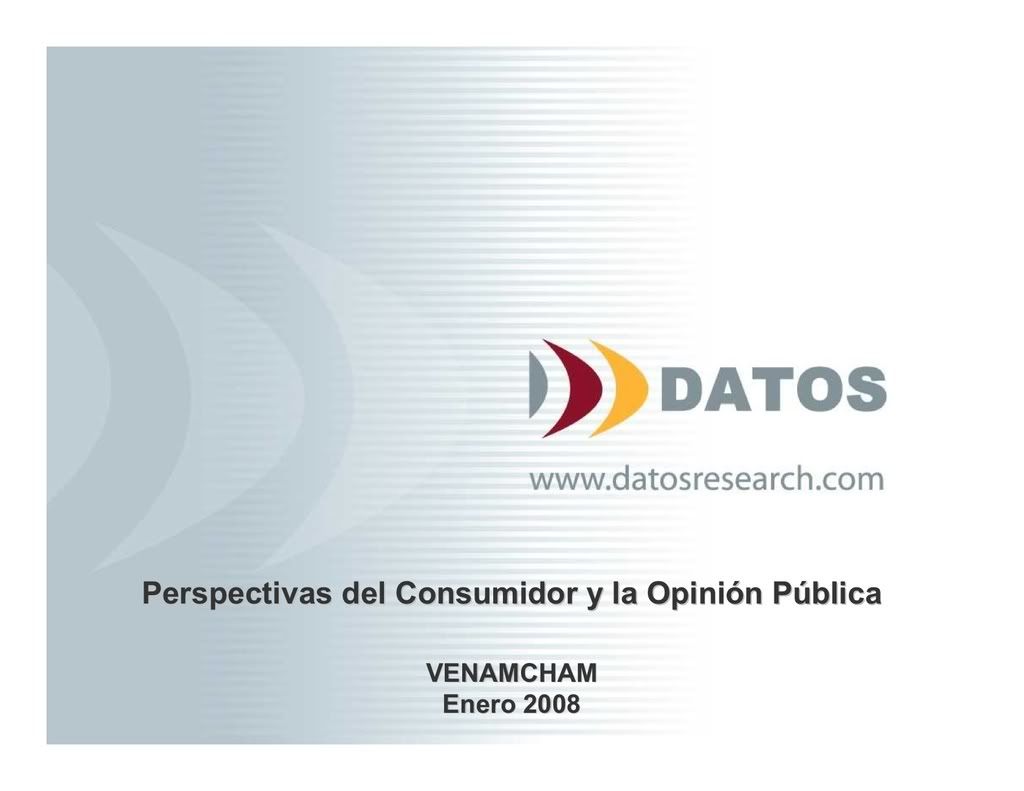
First we see some basic economic indicators that we are already familiar with:
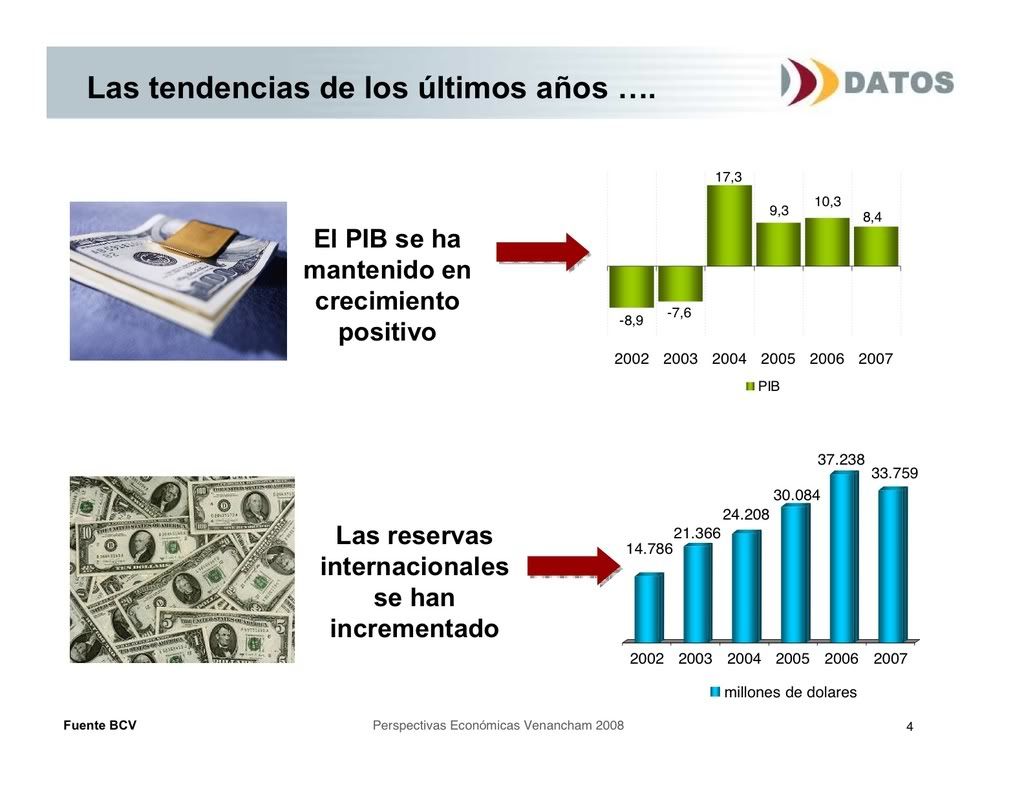
The Venezuelan economy has experienced very strong growth since recovering from the opposition led oil strike of 02/03 and international reserves have grown solidly even with money being taken out for the FONDEN development fund.
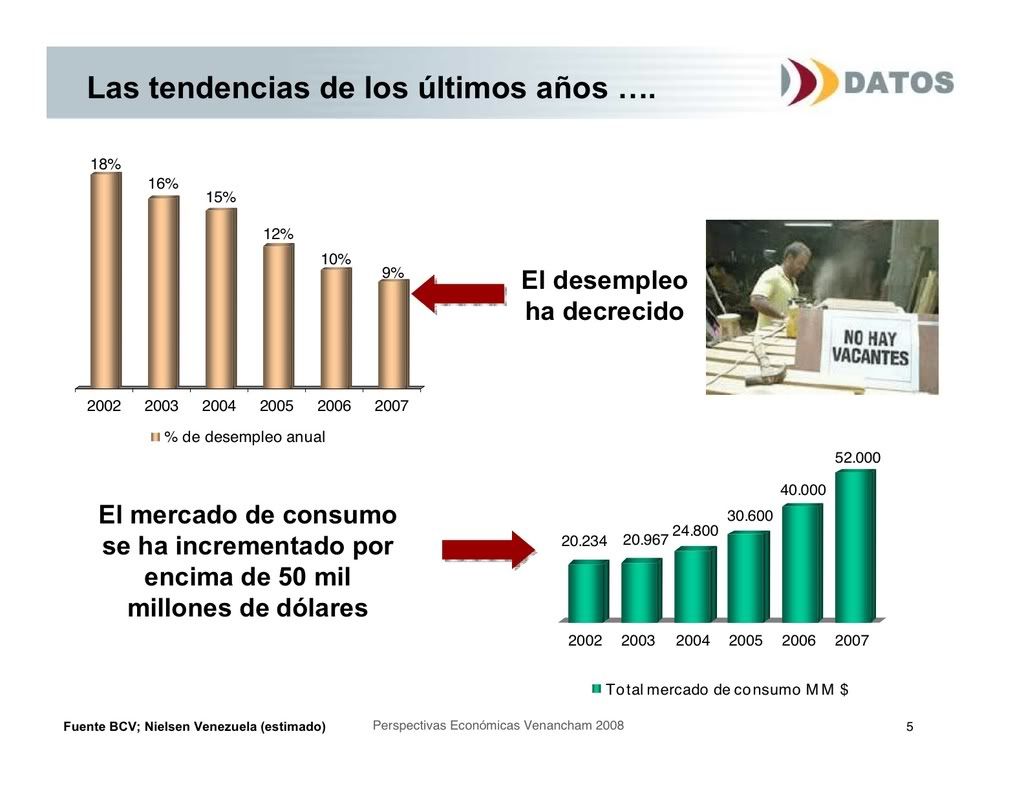
Here we see that unemployment is way down. Even more impressive we see that consumption is WAY up, having more than doubled since 2004 when the country had already recovered from the oil strike depression. Clearly peoples standard of living is WAY WAY up.
Next we see that as peoples economic problems have been alleviated other problems have moved to the fore:

In this slide we see what people identify as the major problems confronting them. On the left we have the fourth quarter of 2003 and on the right we have the final quarter of 2007. Yellow is "high cost of living/economic crisis", green is "unemployment", and red is "crime". We see that economic concerns have dropped tremendously while worry over crime has surged.
Memo to Chavez and his supporters: quit worrying about inflation - it is not a major problem (especially by historical standards) and is not nearly as worrisome to people as it used to be. Rather something must absolutely, positively be done about crime.
Here we see the effects of shortages:
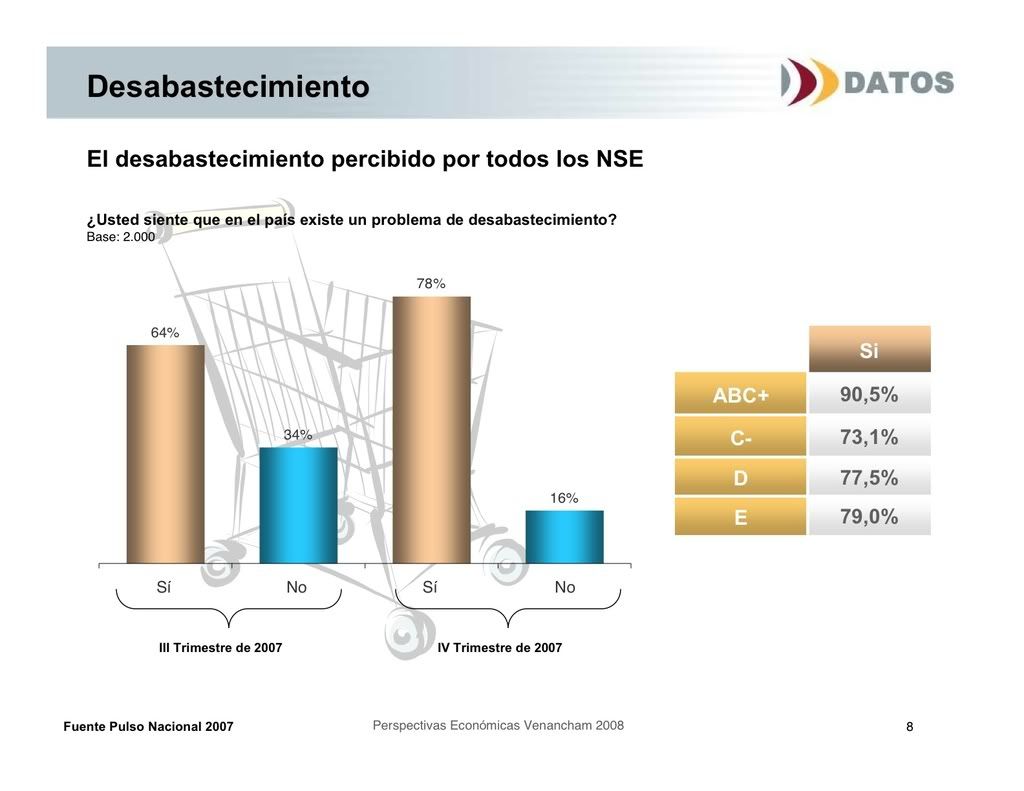
In just one quarter the problem worsened significantly. So while some objected the the solution I proposed in the previous post clearly something needs to be done.
People's political tendencies are not that surprising.
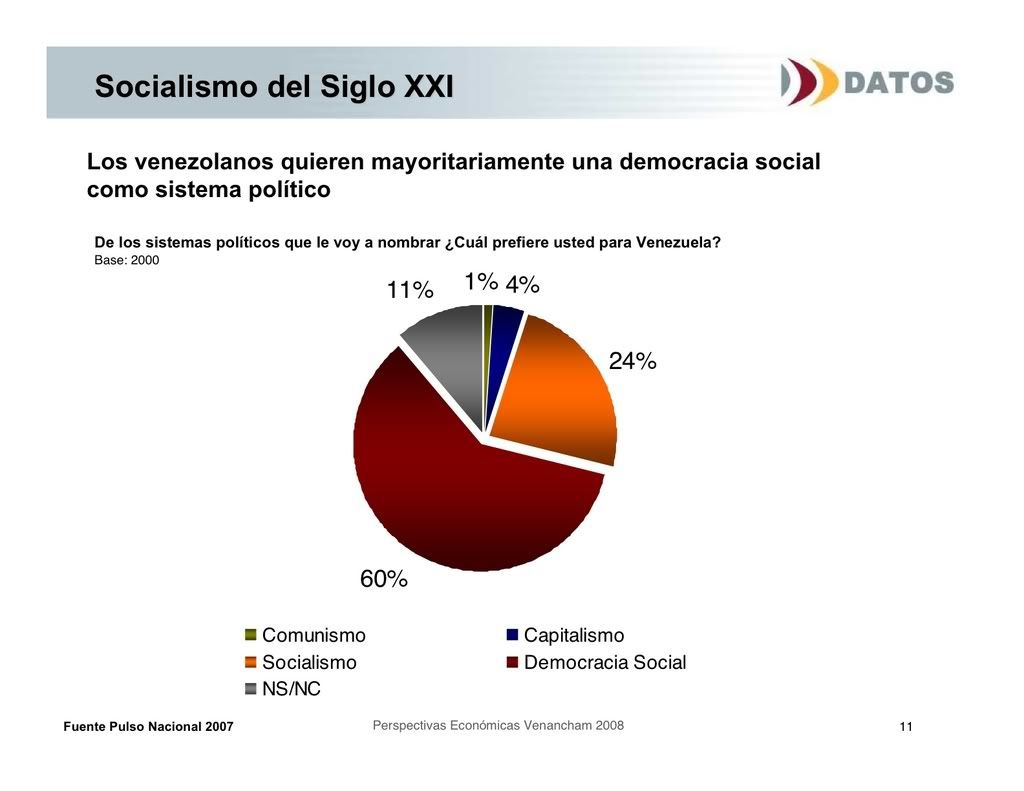
Communism is desired by 1%, socialism by 24%, social democracy by 60% and capitalism by 4%.
Venezuela is pretty far to the left compared to some places, like the United States, but it is not as leftist as Chavez would probably like.
Next we get to some interesting polling on peoples perception of their well being and the state of the economy:
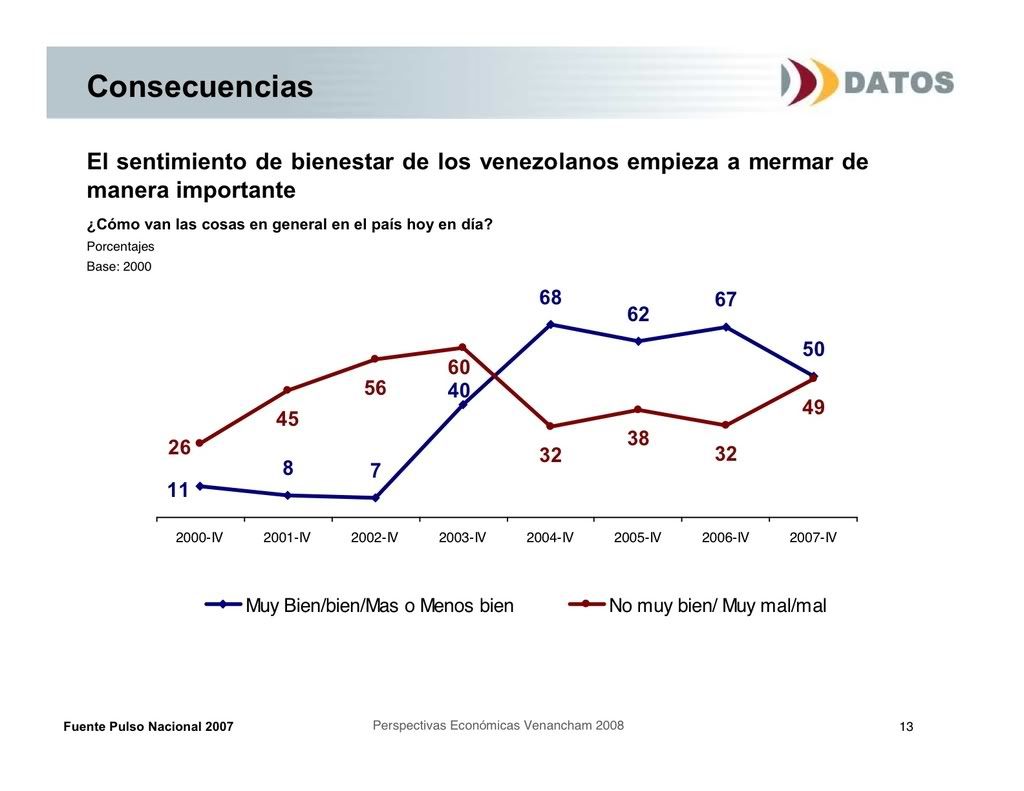
This chart shows how people think things are going in the country with the blue line indicating they are going well and the red line indicating the percentage who think it isn't going well. Note that from 2004 to 2006 a large majority thought the country was doing quite well. That has now dropped off to being basically 50/50.
I would guess Chavez's belligerence, the RCTV situation, and shortages all led to that decline.
Having said that, this is anything but catastrophic for Chavez. Note that there are no major elections scheduled this year and Chavez himself isn't even eligible for recall for two more years. Further, while mediocre these numbers are nowhere near as negative as they were between 2000 and 2003.
So there is no need to panic, just a need to start governing effectively, fix festering problems and focus on long term development strategies. Chavez shouldn't focus on the polls, they are meaningless right now. If he focuses on governing the polls will take care of themselves.
Along the same theme:

Here we see how people view the current economic situation of the country with those who think it is better in blue and those who think it is worse in red.
There is something interesting to be said about this slide. Note that most peoples PERCEPTION is that the economy is worse now than last year. Yet we saw in one of the first slides that consumption went way up last year meaning in point of fact people were better off economically in 2007 versus 2006.
Why the divergence between perception and reality?
My guess would be two things. First, in Venezuelan the opposition media is still quite powerful and are capable of creating perceptions that don't match reality. Note even in 2004 and 2005 when the economy was growing even faster than it is now most people thought the economy was worse off than before. This is just absurd when one considers that in 2004 the economy boomed by 17% whereas in the previous year the country had been in a depression. How could people in 2004 possibly say that they were worse off then than in 2003?!?!?!? Clearly the medias ability to manipulate perceptions is powerful.
Secondly, even though consumption has increased even over the past year it is possible that that consumption has become more oriented towards the upper classes. That is, fewer people are benefiting from the boom and those who are tend to be anti-Chavez and negative about the state of the economy anyways. Along with that the lower classes may have seen the increase in their consumption slow.
In prior years DATOS published slides showing how the income of the various social stata fared. In this presentation they didn't do that. So it is impossible to tell if the second point is true, but I think it quite likely.
Next we see peoples expectations about the future:
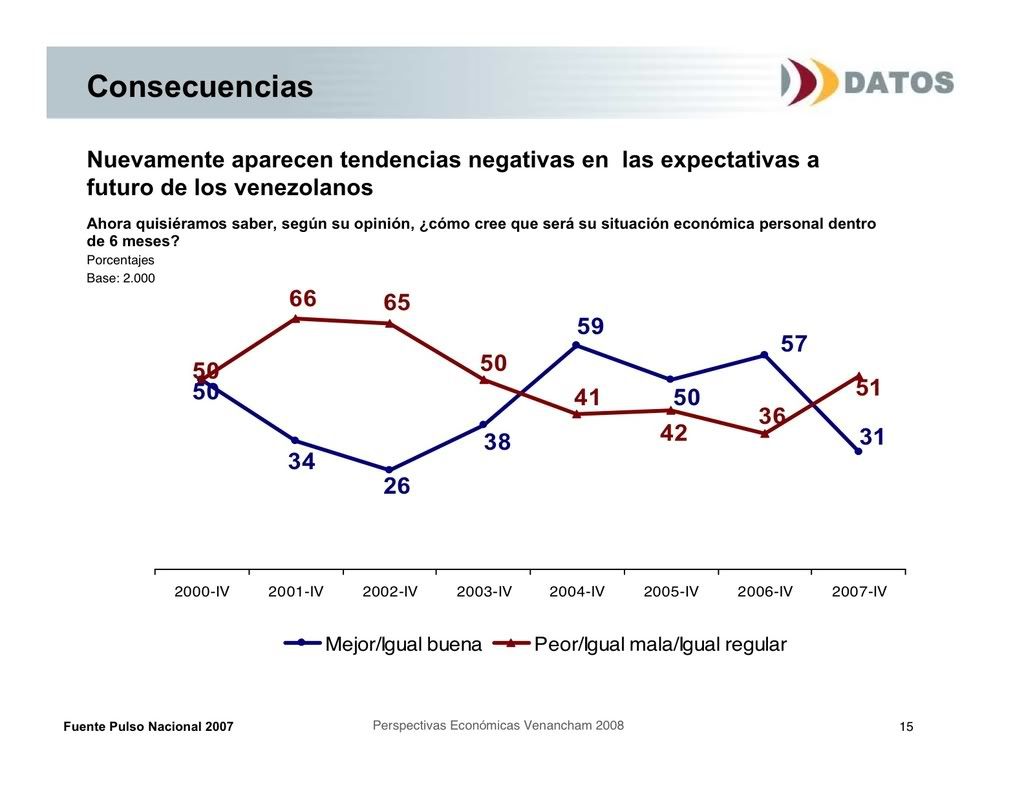
Again the blue line is for those who think the next country will be better off and the red line for those who think it will be worse off.
Finally, we see Venezuela's consumer confidence indicators:
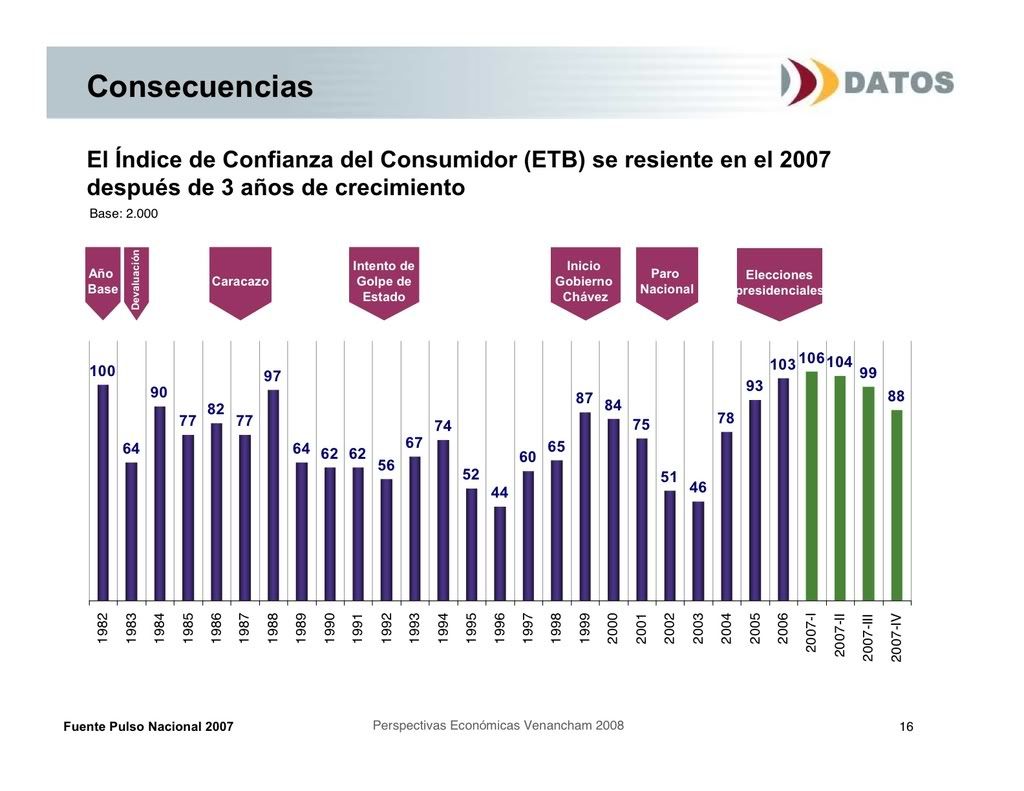
It is given annually going back to 1982 (which serves as the baseline of 100). However for 2007, which is in green, we see it for each quarter.
We see that consumer confidence dropped steadily throughout 2007 with the drop in the fourth quarter being the biggest. After years of increase clearly consumers are growing more concerned.
However, it should be noted even with it having dropped to 88 consumer confidence currently exceeds every year going back to 1988 and is higher than any of the early years of the Chavez administration.
What is the conclusion to be drawn from all this? Simple. Things have fallen off in terms of peoples perceptions and happiness over the past year or so. That is clear. However it is also clear that people are still more sanguine about the country than they have been for most all of Venezuela's recent history.
Given that while changes are in order there is no need to hit the panic button. Chavez shouldn't focus on short term fixes meant to immediately boost his, and the economies, standing in the polls. Those fixes will likely lead to worse outcomes over the medium and long term. Further, any boosting of poll numbers from those type of measure will likely dissipate before any meaningful elections come along.
Rather Chavez needs to spend time with his cabinet deliberating and coming up with serious and effective solutions to Venezuela's problems that will yield results over the medium to long term. As long as the government does that the only thing it has to fear, to paraphrase FDR, is fear itself.
|
For that reason it is worth some time taking a look at a presentation they gave recently on the reality and sentiments of the Venezuelan consumer:

First we see some basic economic indicators that we are already familiar with:

The Venezuelan economy has experienced very strong growth since recovering from the opposition led oil strike of 02/03 and international reserves have grown solidly even with money being taken out for the FONDEN development fund.

Here we see that unemployment is way down. Even more impressive we see that consumption is WAY up, having more than doubled since 2004 when the country had already recovered from the oil strike depression. Clearly peoples standard of living is WAY WAY up.
Next we see that as peoples economic problems have been alleviated other problems have moved to the fore:

In this slide we see what people identify as the major problems confronting them. On the left we have the fourth quarter of 2003 and on the right we have the final quarter of 2007. Yellow is "high cost of living/economic crisis", green is "unemployment", and red is "crime". We see that economic concerns have dropped tremendously while worry over crime has surged.
Memo to Chavez and his supporters: quit worrying about inflation - it is not a major problem (especially by historical standards) and is not nearly as worrisome to people as it used to be. Rather something must absolutely, positively be done about crime.
Here we see the effects of shortages:

In just one quarter the problem worsened significantly. So while some objected the the solution I proposed in the previous post clearly something needs to be done.
People's political tendencies are not that surprising.

Communism is desired by 1%, socialism by 24%, social democracy by 60% and capitalism by 4%.
Venezuela is pretty far to the left compared to some places, like the United States, but it is not as leftist as Chavez would probably like.
Next we get to some interesting polling on peoples perception of their well being and the state of the economy:

This chart shows how people think things are going in the country with the blue line indicating they are going well and the red line indicating the percentage who think it isn't going well. Note that from 2004 to 2006 a large majority thought the country was doing quite well. That has now dropped off to being basically 50/50.
I would guess Chavez's belligerence, the RCTV situation, and shortages all led to that decline.
Having said that, this is anything but catastrophic for Chavez. Note that there are no major elections scheduled this year and Chavez himself isn't even eligible for recall for two more years. Further, while mediocre these numbers are nowhere near as negative as they were between 2000 and 2003.
So there is no need to panic, just a need to start governing effectively, fix festering problems and focus on long term development strategies. Chavez shouldn't focus on the polls, they are meaningless right now. If he focuses on governing the polls will take care of themselves.
Along the same theme:

Here we see how people view the current economic situation of the country with those who think it is better in blue and those who think it is worse in red.
There is something interesting to be said about this slide. Note that most peoples PERCEPTION is that the economy is worse now than last year. Yet we saw in one of the first slides that consumption went way up last year meaning in point of fact people were better off economically in 2007 versus 2006.
Why the divergence between perception and reality?
My guess would be two things. First, in Venezuelan the opposition media is still quite powerful and are capable of creating perceptions that don't match reality. Note even in 2004 and 2005 when the economy was growing even faster than it is now most people thought the economy was worse off than before. This is just absurd when one considers that in 2004 the economy boomed by 17% whereas in the previous year the country had been in a depression. How could people in 2004 possibly say that they were worse off then than in 2003?!?!?!? Clearly the medias ability to manipulate perceptions is powerful.
Secondly, even though consumption has increased even over the past year it is possible that that consumption has become more oriented towards the upper classes. That is, fewer people are benefiting from the boom and those who are tend to be anti-Chavez and negative about the state of the economy anyways. Along with that the lower classes may have seen the increase in their consumption slow.
In prior years DATOS published slides showing how the income of the various social stata fared. In this presentation they didn't do that. So it is impossible to tell if the second point is true, but I think it quite likely.
Next we see peoples expectations about the future:

Again the blue line is for those who think the next country will be better off and the red line for those who think it will be worse off.
Finally, we see Venezuela's consumer confidence indicators:

It is given annually going back to 1982 (which serves as the baseline of 100). However for 2007, which is in green, we see it for each quarter.
We see that consumer confidence dropped steadily throughout 2007 with the drop in the fourth quarter being the biggest. After years of increase clearly consumers are growing more concerned.
However, it should be noted even with it having dropped to 88 consumer confidence currently exceeds every year going back to 1988 and is higher than any of the early years of the Chavez administration.
What is the conclusion to be drawn from all this? Simple. Things have fallen off in terms of peoples perceptions and happiness over the past year or so. That is clear. However it is also clear that people are still more sanguine about the country than they have been for most all of Venezuela's recent history.
Given that while changes are in order there is no need to hit the panic button. Chavez shouldn't focus on short term fixes meant to immediately boost his, and the economies, standing in the polls. Those fixes will likely lead to worse outcomes over the medium and long term. Further, any boosting of poll numbers from those type of measure will likely dissipate before any meaningful elections come along.
Rather Chavez needs to spend time with his cabinet deliberating and coming up with serious and effective solutions to Venezuela's problems that will yield results over the medium to long term. As long as the government does that the only thing it has to fear, to paraphrase FDR, is fear itself.
|
